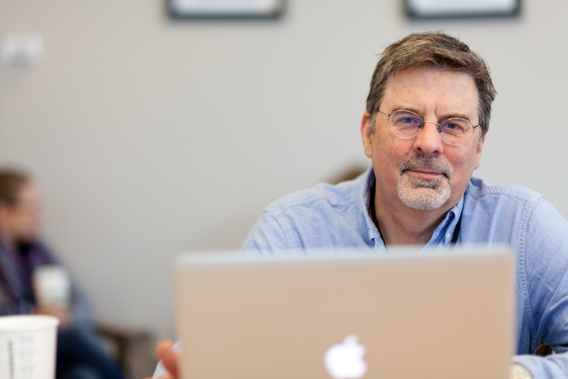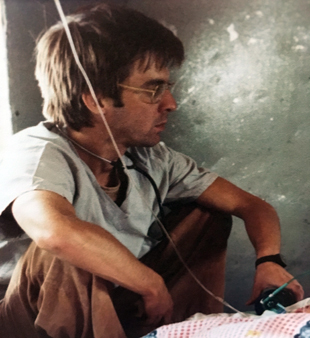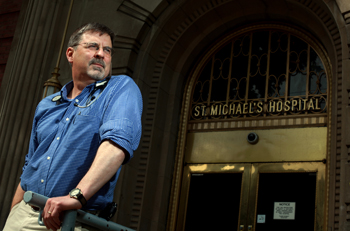Dr. Andreas Laupacis steps down from Li Ka Shing Knowledge Institute leadership

By Ana Gajic

After more than ten years at the helm, Dr. Andreas Laupacis will be stepping down from his role as executive director of the Li Ka Shing Knowledge Institute at the end of March.
It will come as no surprise to Dr. Andreas Laupacis’ mentees that it was his own mentor who inspired him to pursue research in the early years of his clinical career.
Dr. Laupacis, now a valued mentor in his own right, took two years off from his residency to work alongside his mentor, Western University’s Dr. Calvin Stiller, on a novel drug for kidney transplants in the early days of transplantation. The drug, cyclosporine, was very beneficial.
“That turned me on to the impact of research, that it could truly transform lives,” said Dr. Laupacis, executive director of the Li Ka Shing Knowledge Institute.
After more than a decade at the helm of the LKSKI, Dr. Laupacis will step down at the end of March. He’ll maintain his research and clinical practice at St. Michael’s, and will be taking on the new role of lead of patient involvement in the University of Toronto’s Department of Medicine. He’ll also continue to mentor those around him who have turned to him for guidance and support over the years.
The road to St. Michael’s

As a fourth-year medical student at Queen’s, Dr. Laupacis spent time working in Moose Factory in Northern Ontario, seeing a variety of medical cases.
As Dr. Laupacis is the first to admit, he didn’t set out to lead a high-powered research institute. Instead, he went where his interests took him.
“I don’t think I’ve planned a single career move in my life,” he said. “For those of us who are clinician-researchers, we don’t realize how lucky we are. We have the ability to change significantly what we do and still be able to contribute.”
From an education that took him from Queen’s University to Dalhousie University and back to Ontario, and then to a professional career during which he has been the CEO of the Institute for Clinical Evaluative Sciences, the first chair of the Canadian Expert Drug Advisory Committee, the board chair of Health Quality Ontario and a clinician at many hospitals, Dr. Laupacis has embraced each new opportunity with open arms.
Just as his roles and titles have changed over the years, so have his research interests.
“I went from doing randomized trials to decision aids and then to cost effectiveness analyses. Now, I’m interested in patient involvement in research and health care.”
In 2006, Dr. Laupacis made the move to head the LKSKI, where he was able to help the institute grow, pursue his own research questions, and work at St. Michael’s Hospital as a palliative care physician.
“There’s no question that research knowledge generation is an integral core part of St. Michael’s,” he said. “When I first came here there was still talk of needing to bring some people around to that idea. That time has long past. It is pretty well embraced by all.”
Mentorship: ‘A great multiplying effect’

Twelve years ago, Dr. Laupacis made the move to St. Michael’s to head up the LKSKI.
Dr. Laupacis’ role as a mentor, especially to emerging scientists, has been an ever-present element of his career.
“He invests a lot of time and energy into his mentees,” said Dr. Michelle Sholzberg, associate scientist at the LKSKI, hematologist and medical director of the Coagulation Lab at St. Michael’s. Dr. Laupacis has been her mentor for seven years.
“Andreas has shaped the course of my career because he helped me believe in myself and helped convert my ideas into realities,” she said. “He builds you up, but he builds you up from within. Now that I’m shifting in my career, he has shaped the type of mentor I’ve become.”
Mentorship is one of the greatest pleasures of Dr. Laupacis’ job, he explained.
“It’s a great multiplying effect when you mentor people,” he said. “And, from a selfish point of view, I learn a lot from them. Young folks are at the most innovative point of their careers, and they teach me things every day.”
Looking forward
As he prepares to step down from his leadership position at the LKSKI, Dr. Laupacis has been recognized for his work with two recent awards from the University of Toronto. He is the recipient of a President’s Impact Award and the 2017 Carolyn Tuohy Impact on Public Policy Award, both honouring the achievements of researchers whose work has had significant impact beyond academia.
“I am honoured to receive an award named after Carolyn Tuohy, a public policy researcher whose work I’ve admired and someone I’ve had the pleasure of working with in the past,” he said.
In addition to receiving these honours from the University, Dr. Slutsky and Dr. Thomas Parker, Chief of the Department of Medicine, have also announced the establishment of the Dr. Andreas Laupacis Lectureship in Health Services and Policy Research at the LKSKI.
“He’s certainly too humble to admit it, but Andreas has been critical to building this institute to be the high-powered, high-quality enterprise it is today,” Dr. Slutsky said. “Without his leadership, we wouldn’t have come this far. In addition, Andreas has been a valued friend, colleague and mentor to me personally over the years. I’m going to miss working so closely with him.”

Though he’ll keep a full schedule professionally, Dr. Laupacis will continue to spend time outdoors at his family’s farm in the Ottawa Valley, and occasionally taking a kayak ride with his dog, Jake.
Stepping down from the LKSKI will not signal the end of Dr. Laupacis’ professional journey. He’ll continue his research and clinical work at St. Michael’s, keep an office here, and also take on his new role at the University of Toronto. He will remain editor-in-chief of HealthyDebate, a website he started to generate accessible knowledge about health policy. Dr. Patricia O’Campo, who holds the Chair in Intersectoral Solutions to Urban Health Problems and is a researcher at the LKSKI, will become the institute’s interim executive director.
Dr. Laupacis will keep tabs on the research coming out of LKSKI, with a special interest in projects that leverage big data to influence patient care and analyze the social determinants of health. For him, this focus has been integral to the institute.
“People have described St. Michael’s as high-tech, high-touch. I’ve valued both. The high touch part of the hospital is important because it means the hospital recognizes that we are part of a larger health system and society, and people’s life history and values are exceptionally important.”
About St. Michael’s Hospital
St. Michael’s Hospital provides compassionate care to all who enter its doors. The hospital also provides outstanding medical education to future health care professionals in more than 29 academic disciplines. Critical care and trauma, heart disease, neurosurgery, diabetes, cancer care, care of the homeless and global health are among the Hospital’s recognized areas of expertise. Through the Keenan Research Centre and the Li Ka Shing International Healthcare Education Centre, which make up the Li Ka Shing Knowledge Institute, research and education at St. Michael’s Hospital are recognized and make an impact around the world. Founded in 1892, the hospital is fully affiliated with the University of Toronto.
